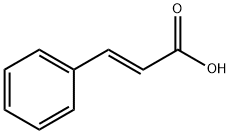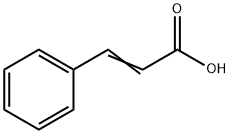A2346112
Chnnamyl alcohol , 98% , 104-54-1
Synonym(s):
3-Phenyl-2-propen-1-ol
CAS NO.:104-54-1
Empirical Formula: C9H10O
Molecular Weight: 134.18
MDL number: MFCD00002921
EINECS: 203-212-3
| Pack Size | Price | Stock | Quantity |
| 100g | RMB39.20 | In Stock |
|
| 250G | RMB67.20 | In Stock |
|
| 1KG | RMB216.80 | In Stock |
|
| others | Enquire |
Update time: 2022-07-08
PRODUCT Properties
| Melting point: | 30-33 °C (lit.) |
| Boiling point: | 250 °C (lit.) |
| Density | 1.044 g/mL at 25 °C (lit.) |
| vapor density | 4.6 (vs air) |
| vapor pressure | <0.01 mm Hg ( 25 °C) |
| FEMA | 2294 | CINNAMYL ALCOHOL |
| refractive index | 1.5819 |
| Flash point: | >230 °F |
| storage temp. | -20°C |
| solubility | H2O: soluble |
| form | Fused Low Melting Crystalline Solid |
| pka | 0.852[at 20 ℃] |
| Specific Gravity | 1.044 |
| color | White |
| Odor | at 100.00 %. sweet balsam hyacinth spicy green powdery cinnamic |
| Odor Type | balsamic |
| biological source | synthetic |
| Water Solubility | 1.8 g/L (20 ºC) |
| Merck | 14,2302 |
| JECFA Number | 647 |
| BRN | 1903999 |
| Stability: | Stable. Incompatible with strong oxidizing agents. |
| InChIKey | OOCCDEMITAIZTP-QPJJXVBHSA-N |
| LogP | 1.452 at 25℃ |
| CAS DataBase Reference | 104-54-1(CAS DataBase Reference) |
| NIST Chemistry Reference | 2-Propen-1-ol, 3-phenyl-(104-54-1) |
| EPA Substance Registry System | 3-Phenyl-2-propen-1-ol (104-54-1) |
Description and Uses
Occupational cases of contact dermatitis were reported in the perfurne industry. Patch tests can also be positive in food handlers. Cinnamic alcohol is contained in the "fragrance mix".
Cinnamic alcohol is a component in perfumed cosmetic products and deodorants; some perfumery uses (cinnamon; daffodil; hyacinth; jasmine); natural occurrence (cinnamon).
Safety
| Symbol(GHS) |   GHS07,GHS09 |
| Signal word | Warning |
| Hazard statements | H302-H317-H411 |
| Precautionary statements | P261-P264-P273-P280-P301+P312-P302+P352 |
| Hazard Codes | Xn |
| Risk Statements | 22-36/38-43-36 |
| Safety Statements | 26-36/37-37/39-24-24/25 |
| RIDADR | 2811 |
| WGK Germany | 2 |
| RTECS | GE2200000 |
| F | 10-23 |
| TSCA | Yes |
| HS Code | 29062990 |
| Hazardous Substances Data | 104-54-1(Hazardous Substances Data) |
| Toxicity | LD50 (g/kg): 2.0 orally in rats; >5.0 dermally in rabbits (Letizia) |



